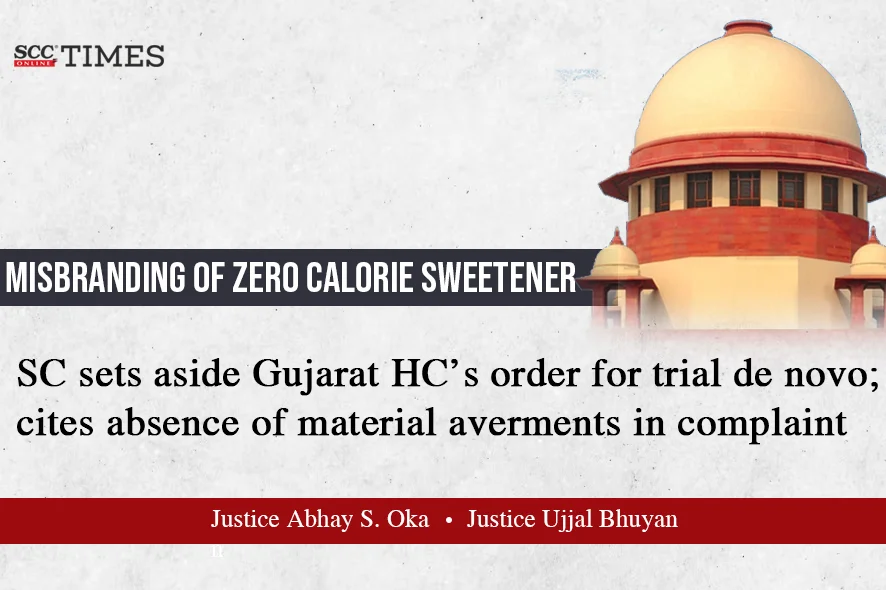Supreme Court: In a criminal appeal against Gujarat High Court’s decision, wherein the State’s appeal against the order of the Trial Court acquitting the accused of the charges under Section 7 read with Section 16 of the Prevention of Food Adulteration Act, 1954 (‘the Act’) was allowed, setting aside the Trial Court’s order and the matter was remanded for trial de novo, the Division Bench of Abhay S. Oka and Ujjal Bhuyan, JJ. allowed the appeal and set aside the High Court’s order.
In the matter at hand, a complaint was filed by the Food Inspector alleging violation of Rules 47(iii) and Rule 42(zzz) of the Prevention of Food Adulteration Rules, 1955 (‘the Rules’). Rule 47 deals with the restrictions on the use and sale of artificial sweeteners.
The Court noted that Rule 47(1) lays down the general rule that no artificial sweetener should be added to any article or food and Rule 47(3) provides that no person shall sell table top sweeteners except under a label declaration as provided under Rule 42(zzz) (1) and (2).
On perusal of the complaint, the Court noted that the Food Inspector’s case was not that the appellants were manufacturing table top sweeteners. The Court said that it was not the case that table top sweetener was being manufactured and sold and that it was a case for violation of Rule 42(zzz) (12) of the Rules, which provides that every package of food which is permitted to contain a mixture of espartam methyl ester and s. sulfame potassium must contain label in the form prescribed. The Court added that it was not the case made out in the complaint and the specific averment as to manufacturing and selling table top sweeteners was missing. The Court also perused the public analyst’s report, wherein it was opined that the sample collected was of zero-calorie sweetener, which was mis-branded as the same did not comply with Rule 42(zzz) (12) and Rule 47(3) of the Rules.
The Court said that even in the examination under Section 313 of the Code of Criminal Procedure, 1973, it was not put to the accused that they were manufacturing and selling table top sweeteners.
The Court viewed that the Trial Court ought not to have taken the cognizance and opined that no purpose would be served by remanding the trial, in absence of a case made out in the complaint that the accused were found manufacturing and selling the table top sweeteners. Further, the Court said that in absence of material averments in the complaint, the Trial Court passed the order of acquittal. The Court termed the High Court’s order a ‘drastic order’ for passing order of the de novo trial after framing a proper charge.
Further, the Court said that the burden of proof cannot be put on the accused to prove that they were not manufacturing table top sweeteners as the State’s case was not that the accused were manufacturing table top sweeteners. Therefore, the Court upheld and restored the Trial Court’s acquittal order and that there was no occasion for interfering and passing an order of remand in appeal against acquittal. Thus, the Court allowed the appeal and set aside the impugned order of the High Court.
[Sailendrabhai Damodarbhai Shah v. State of Gujarat, 2024 SCC OnLine SC 285, Order dated: 08-02-2024]
Advocates who appeared in this case :
For the Appellant: Senior Advocate Dr. S. Muralidhar, Advocate Ajay Bhargava, Advocate Sahil Narang, Advocate Dhritiman Roy, Advocate Madhavam Sharma, Advocate Sania Abbasi







